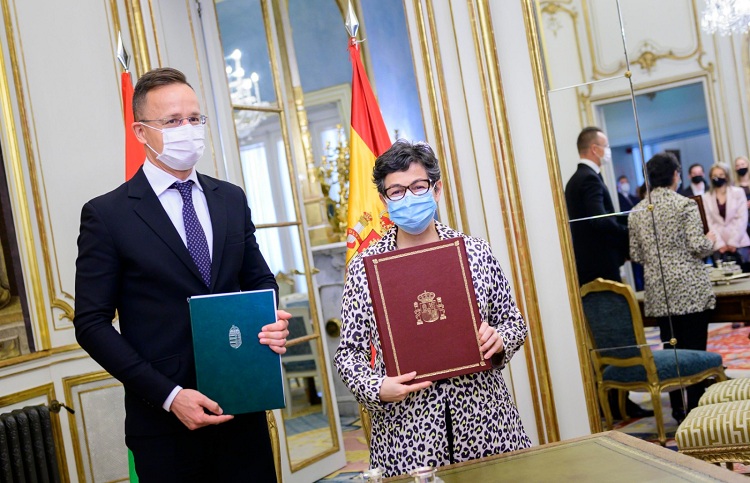Eduardo González
The Minister of Foreign Affairs, Arancha González Laya, yesterday again dodged a potentially slippery issue for her Department, in this case Venezuela’s formal request for the extradition of opposition leader Leopoldo López.
The Ministry of Foreign Affairs received this past Tuesday the request from Nicolás Maduro’s regime for the extradition of Leopoldo López, who was sentenced to fourteen years in prison for inciting violence during the 2014 anti-government protests. The request had been approved last May 11 by the Venezuelan Supreme Court of Justice, which assured in a statement that López should serve in Venezuelan territory the rest of his sentence, specifically “eight years, six months, 25 days and 12 hours”, for the crimes of “determiner in the crime of arson, determiner in the crime of damage, author in the crime of public instigation and that of association”.
“We received it yesterday and we will process it, as it is always done”, declared González Laya after a question on this issue during the joint press conference with his Hungarian counterpart, Péter Szijjártó, in the Viana Palace. “I am not going to go into discussing the response that the Government of Spain is going to give to a request that has just arrived in our country”, she added, without further details.
Once in the hands of the Foreign Ministry, the request will be transferred to the Council of Ministers, which will have the power to accept or reject it. The rejection would automatically imply the end of the process, but in case the request from Caracas is accepted, the case would pass to the Audiencia Nacional. (National Court). If the highest court rejects the extradition, the case will be closed, but if it accepts it, the final decision will again correspond to the Government.
According to international law (specifically, the European Convention on Extradition and the Inter-American Convention on Extradition), governments may not grant extradition on political grounds or for “ordinary crimes prosecuted for political purposes”. In addition, the requested State may refuse extradition when the person sought has been granted asylum status, “when the crime is punishable in the requesting State by death penalty, deprivation of liberty for life or infamous penalties” or “if it considers that the process that led to the conviction did not respect the minimum rights of defense recognized to any accused person”. Likewise, both the Spanish Constitutional Court and the European Court of Human Rights have warned that an extradition must be denied when there is “a rational and well-founded fear” that fundamental rights (in the form of torture or inhuman or degrading punishment or treatment) of the requested person will be violated by the requesting State.
Leopoldo López arrived in Spain on October 24 last year, after fleeing Venezuela and after having spent 18 months in the residence of the Spanish ambassador in Caracas, where he was a guest while he was wanted by the local justice system and accused of being a terrorist by the Venezuelan government. The opponent entered the ambassador’s residence after he was released from house arrest on April 30, 2019, to join an attempted military uprising led by the also oppositionist Juan Guaidó.
US Embassy announces reward for Pollo Carvajal
On the other hand, the U.S. Embassy in Spain issued yesterday a communiqué from the State Department offering a reward of ten million dollars for any information leading to the arrest or conviction of former Chavista intelligence chief Hugo Carvajal, who has been missing for a year and a half after the National Court ordered his extradition to the United States.
The former Venezuelan general, also known as Pollo Carvajal, is linked to several cases opened by the US Department of Justice for his role in international drug trafficking. “While occupying key positions in the Maduro regime, this individual violated the public trust by facilitating narcotics shipments from Venezuela”, states the note published on the Embassy’s website.
“The Venezuelan people deserve a transparent, accountable, and representative government that addresses the needs of the people, and does not betray the people’s trust by condoning or employing public officials who engage in the illicit narcotics trade. The United States is committed to helping the Venezuelan people restore their democracy through free and fair presidential elections that will provide them with honest and competent national leadership”, it added.
Last May 24, Carvajal published a message on Twitter in which he denounced the “irregularities” committed by the Spanish Justice and Government during the extradition process. “I went to Spain trusting that its justice system would find the truth about my case. I thought that its institutions would unveil the lies and inconsistencies with which the U.S. Attorney’s Office is pursuing me. I bet my life that my rights would be protected. Evidently, none of this has happened yet,” said the former military officer, who fled to Spain after breaking with the Maduro regime. For this reason, he has decided to go “underground” to avoid the “relentless persecution” and “political interference” of the Spanish justice system.







